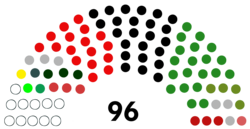| Province | District | No. of Voters | Seat No |
|---|
| Balochistan | Awaran | 56,387 | NA-270 |
| Balochistan | Barkhan | 55,327 | NA-263 |
| Balochistan | Chagai | 66,836 | NA-260 |
| Balochistan | Dera Bugti | 63,953 | NA-265 |
| Balochistan | Gwadar | 93,650 | NA-272 |
| Balochistan | Harnai | 33,140 | NA-265 |
| Balochistan | Jaffarabad | 247,316 | NA-266 |
| Balochistan | Jhal Magsi | 44,533 | NA-267 |
| Balochistan | Kachhi (Bolan) | 103,108 | NA-267 |
| Balochistan | Kalat | 104,445 | NA-268 |
| Balochistan | Kech | 173,972 | NA-272 |
| Balochistan | Kharan | 45,176 | NA-271 |
| Balochistan | Khuzdar | 165,593 | NA-269 |
| Balochistan | Killa Abdullah | 184,832 | NA-262 |
| Balochistan | Killa Saifullah | 88,424 | NA-264 |
| Balochistan | Kohlu | 38,624 | NA-265 |
| Balochistan | Lasbela | 182,697 | NA-270 |
| Balochistan | Loralai | 107,028 | NA-263 |
| Balochistan | Mastung | 80,118 | NA-268 |
| Balochistan | Musakhel | 51,864 | NA-263 |
| Balochistan | Nasirabad | 162,349 | NA-266 |
| Balochistan | Nushki | 61,878 | NA-260 |
| Balochistan | Panjgur | 74,751 | NA-271 |
| Balochistan | Pishin | 196,859 | NA-261 |
| Balochistan | Quetta | 559,939 | NA-259 |
| Balochistan | Sherani | 31,837 | NA-264 |
| Balochistan | Sibi | 75,832 | NA-265 |
| Balochistan | Washuk | 38,171 | NA-271 |
| Balochistan | Zhob | 96,278 | NA-264 |
| Balochistan | Ziarat | 51,742 | NA-261 |
| BALOCHISTAN | TOTAL | 3,336,659 | NA-259 to NA-272 |
| FATA | Bajaur Agency | 353,554 | NA-43, NA-44 |
| FATA | F.R. Bannu | 9,482 | NA-47 |
| FATA | F.R. D. I. Khan | 22,269 | NA-47 |
| FATA | F.R. Kohat | 41,070 | NA-47 |
| FATA | F.R. Lakki Marwat | 9,939 | NA-47 |
| FATA | F.R. Peshawar | 23,371 | NA-47 |
| FATA | F.R. Tank | 15,581 | NA-47 |
| FATA | Khyber Agency | 336,763 | NA-45, NA-46 |
| FATA | Kurram Agency | 262,021 | NA-37, NA-38 |
| FATA | Mohmand Agency | 177,244 | NA-36 |
| FATA | North Waziristan Agency | 160,666 | NA-40 |
| FATA | Orakzai Agency | 125,687 | NA-39 |
| FATA | South Waziristan Agency | 200,666 | NA-41, NA-42 |
| FATA | TOTAL | 1,738,313 | NA-36 to NA-47 |
| Federal Area | Islamabad | 625,964 | NA-48, NA-49 |
| Khyber Pakhtunkhwa | Abbottabad | 675,188 | NA-17, NA-18 |
| Khyber Pakhtunkhwa | Bannu | 444,059 | NA-26 |
| Khyber Pakhtunkhwa | Batagram | 204,980 | NA-22 |
| Khyber Pakhtunkhwa | Buner | 360,019 | NA-28 |
| Khyber Pakhtunkhwa | Charsadda | 704,680 | NA-7, NA-8 |
| Khyber Pakhtunkhwa | Chitral | 206,909 | NA-32 |
| Khyber Pakhtunkhwa | D. I. Khan | 606,959 | NA-24 |
| Khyber Pakhtunkhwa | Hangu | 214,703 | NA-16 |
| Khyber Pakhtunkhwa | Haripur | 531,866 | NA-19 |
| Khyber Pakhtunkhwa | Karak | 315,087 | NA-15 |
| Khyber Pakhtunkhwa | Kohat | 409,372 | NA-14 |
| Khyber Pakhtunkhwa | Kohistan | 127,015 | NA-23 |
| Khyber Pakhtunkhwa | Lakki Marwat | 330,274 | NA-27 |
| Khyber Pakhtunkhwa | Lower Dir | 541,565 | NA-34 |
| Khyber Pakhtunkhwa | Malakand | 311,172 | NA-35 |
| Khyber Pakhtunkhwa | Mansehra | 742,674 | NA-20 |
| Khyber Pakhtunkhwa | Mardan | 987,122 | NA-9, NA-10, NA-11 |
| Khyber Pakhtunkhwa | Nowshera | 619,914 | NA-5, NA-6 |
| Khyber Pakhtunkhwa | Peshawar | 1,393,144 | NA-1, NA-2, NA-3, NA-4 |
| Khyber Pakhtunkhwa | Shangla | 296,722 | NA-31 |
| Khyber Pakhtunkhwa | Swabi | 714,454 | NA-12, NA-13 |
| Khyber Pakhtunkhwa | Swat | 981,823 | NA-29, NA-30 |
| Khyber Pakhtunkhwa | Tank | 150,585 | NA-25 |
| Khyber Pakhtunkhwa | Tor Ghar | 64,867 | NA-21 |
| Khyber Pakhtunkhwa | Upper Dir | 331,004 | NA-33 |
| KHYBER PAKHTUNKHWA | TOTAL | 12,266,157 | NA-1 to NA-35 |
| Punjab | Attock | 1,022,180 | NA-57, NA-58, NA-59 |
| Punjab | Bahawalnagar | 1,264,077 | NA-188, NA-189, NA-190, NA-191 |
| Punjab | Bahawalpur | 1,522,061 | NA-183, NA-184, NA-185, NA-186, NA-187 |
| Punjab | Bhakkar | 711,837 | NA-73, NA-74 |
| Punjab | Chakwal | 929,747 | NA-60, NA-61 |
| Punjab | Chiniot | 602,290 | NA-86, NA-87, NA-88 |
| Punjab | Dera Ghazi Khan | 1,052,720 | NA-171, NA-172, NA-173 |
| Punjab | Faisalabad | 3,622,748 | NA-75, NA-76, NA-77, NA-78, NA-79,
NA-80, NA-81, NA-82, NA-83, NA-84, NA-85 |
| Punjab | Gujranwala | 2,273,141 | NA-95, NA-96, NA-97, NA-98, NA-99, NA-100, NA-101 |
| Punjab | Gujrat | 1,581,402 | NA-104, NA-105, NA-106, NA-107 |
| Punjab | Hafizabad | 543,646 | NA-102, NA-103 |
| Punjab | Jhang | 1,145,415 | NA-89, NA-90, NA-91 |
| Punjab | Jhelum | 783,571 | NA-62, NA-63 |
| Punjab | Kasur | 1,463,575 | NA-138, NA-139, NA-140, NA-141, NA-142 |
| Punjab | Khanewal | 1,301,926 | NA-156, NA-157, NA-158, NA-159 |
| Punjab | Khushab | 680,471 | NA-69, NA-70 |
| Punjab | Lahore | 4,410,095 | NA-118, NA-119, NA-120, NA-121, NA-122, NA-123, NA-124,
NA-125, NA-126, NA-127, NA-128, NA-129, NA-130 |
| Punjab | Layyah | 736,509 | NA-181, NA-182 |
| Punjab | Lodhran | 727,177 | NA-154, NA-155 |
| Punjab | Mandi Bahauddin | 815,154 | NA-108, NA-109 |
| Punjab | Mianwali | 757,191 | NA-71, NA-72 |
| Punjab | Multan | 2,110,177 | NA-148, NA-149, NA-150, NA-151, NA-152, NA-153 |
| Punjab | Muzaffargarh | 1,681,436 | NA-176, NA-177, NA-178, NA-179, NA-180 |
| Punjab | Nankana Sahib | 623,625 | NA-135, NA-136, NA-137 |
| Punjab | Narowal | 792,379 | NA-115, NA-116, NA-117 |
| Punjab | Okara | 1,396,811 | NA-143, NA-144, NA-145, NA-146, NA-147 |
| Punjab | Pakpattan | 823,478 | NA-164, NA-165, NA-166 |
| Punjab | Rahim Yar Khan | 1,904,615 | NA-192, NA-193, NA-194, NA-195, NA-196, NA-197 |
| Punjab | Rajanpur | 724,286 | NA-174, NA-175 |
| Punjab | Rawalpindi | 2,645,608 | NA-50, NA-51, NA-52, NA-53, NA-54, NA-55, NA-56 |
| Punjab | Sahiwal | 1,190,424 | NA-160, NA-161, NA-162, NA-163 |
| Punjab | Sargodha | 1,861,804 | NA-64, NA-65, NA-66, NA-67, NA-68 |
| Punjab | Sheikhupura | 1,341,341 | NA-131, NA-132, NA-133, NA-134 |
| Punjab | Sialkot | 1,841,347 | NA-110, NA-111, NA-112, NA-113, NA-114 |
| Punjab | Toba Tek Singh | 1,089,508 | NA-92, NA-93, NA-94 |
| Punjab | Vehari | 1,285,562 | NA-167, NA-168, NA-169, NA-170 |
| PUNJAB | TOTAL | 49,259,334 | NA-50 to NA-197 |
| Sindh | Badin | 639,314 | NA-224, NA-225 |
| Sindh | Dadu | 609,609 | NA-231, NA-232, NA-233 |
| Sindh | Ghotki | 568,065 | NA-200, NA-201 |
| Sindh | Hyderabad | 923,140 | NA-218, NA-219, NA-220, NA-221 |
| Sindh | Jacobabad | 394,557 | NA-208, NA-209, NA-210 |
| Sindh | Jamshoro | 369,424 | NA-231 |
| Sindh | Kambar-Shahdadkot | 508,062 | NA-206 |
| Sindh | Karachi Central | 1,632,487 | NA-244, NA-245, NA-246, NA-247 |
| Sindh | Karachi East | 2,093,898 | NA-253, NA-254, NA-255, NA-256 |
| Sindh | Karachi South | 1,131,376 | NA-248, NA-249, NA-250, NA-251, NA-252 |
| Sindh | Karachi West | 1,493,055 | NA-239, NA-240, NA-241, NA-242, NA-243 |
| Sindh | Karachi Malir | 820,421 | NA-257, NA-258 |
| Sindh | Kashmore | 353,616 | NA-210 |
| Sindh | Khairpur | 838,502 | NA-215, NA-216, NA-217 |
| Sindh | Larkana | 585,519 | NA-204, NA-205, NA-207 |
| Sindh | Matiari | 300,486 | NA-223 |
| Sindh | Mirpur Khas | 585,262 | NA-226, NA-227 |
| Sindh | Naushahro Feroze | 600,090 | NA-211, NA-212 |
| Sindh | Sanghar | 793,397 | NA-234, NA-235, NA-236 |
| Sindh | Shaheed Benazirabad | 668,193 | NA-213, NA-214 |
| Sindh | Shikarpur | 488,878 | NA-202, NA-203 |
| Sindh | Sukkur | 527,635 | NA-198, NA-199 |
| Sindh | Tando Allahyar | 286,956 | NA-223 |
| Sindh | Tando Muhammad Khan | 230,554 | NA-222 |
| Sindh | Tharparkar | 471,831 | NA-229, NA-230 |
| Sindh | Thatta | 663,543 | NA-237, NA-238 |
| Sindh | Umerkot | 385,505 | NA-228 |
| SINDH | TOTAL | 18,963,375 | NA-198 to NA-258 |
| PAKISTAN | TOTAL | 0 | |












